May 22, 2025 | 09:15 GMT +7
May 22, 2025 | 09:15 GMT +7
Hotline: 0913.378.918
May 22, 2025 | 09:15 GMT +7
Hotline: 0913.378.918
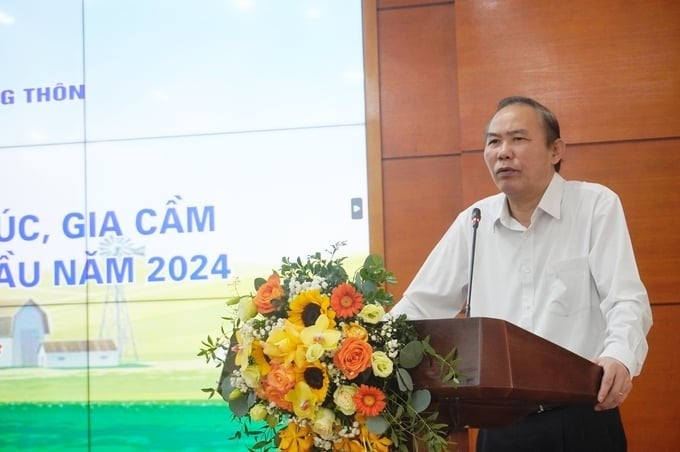
Deputy Minister of Agriculture and Rural Development Phung Duc Tien said: "It is mandatory to look straight at the truth and use all tools, experience, and staff to proactively prevent animal diseases early, from afar." Photo: Hong Tham.
On the morning of November 3, in Hanoi, the Ministry of Agriculture and Rural Development organized a conference on cattle and poultry disease prevention and control in the last months of 2023 and early 2024”.
Mr. Phan Quang Minh, Deputy Director of the Department of Animal Health (Ministry of Agriculture and Rural Development), said that since the beginning of 2023, the whole country has had 481 African swine fever outbreaks in 42 provinces and cities, forcing the destruction of over 18,000 pigs.
Avian influenza caused 19 outbreaks (influenza A/H5N1) in 16 districts and towns in 11 provinces, with a poultry total of nearly 36,000 infected, dead, and destroyed heads. Foot-and-mouth disease nationwide caused 22 type O outbreaks in 15 districts and towns of 11 provinces and cities, with 760 infected cattle and 26 destroyed cattle.
The lumpy skin disease caused 100 outbreaks in 15 provinces and cities. Of which, the number of infected cattle was 468, including 95 destroyed buffaloes and cows. Blue ear disease had five outbreaks, with 542 pigs dying and being destroyed. Anthrax disease appeared in five outbreaks, causing 32 buffaloes and cows to be infected and forced to be destroyed.
Mr. Nguyen Van Long, Director of the Department of Animal Health, said that animal diseases in the world are very complicated. Of which, African swine fever development is still very widespread; bird flu occurs in 71 countries and territories with over 6,300 outbreaks and an extremely high infection risk; and foot-and-mouth disease breaks out for the first time in the island nation of Indonesia, causing heavy losses.
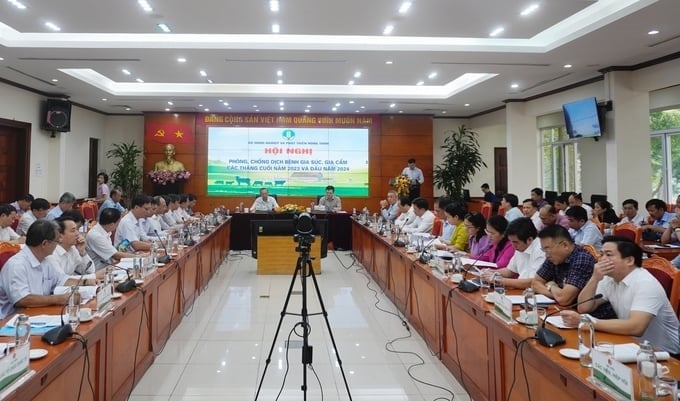
The conference on cattle and poultry disease prevention and control in the last months of 2023 and early 2024 discussed many hot issues in the current livestock and veterinary industry. Photo: Hong Tham.
Mr. Long suggested: "In the country, localities need to clarify whether reported disease information is accurate or not and avoid reporting incorrect or insufficient information, typically like African swine fever data."
The leader of the Department of Animal Health said that with the support of international organizations, localities have received recommendations on the use of specific vaccines. However, many localities do not use vaccines, especially African swine fever vaccines, so the Department asked the provinces and cities to clarify any concerns on this matter.
In particular, smuggled imports happen a lot, but the entire veterinary system, especially the grassroots veterinarian, does not grasp the situation. Mr. Long requested ministries, branches, and localities clarify the problem, causes, and responsibilities to have effective control measures.
According to Mr. Long, Vietnam has sufficiently six national programs and plans to prevent dangerous epidemics, but the local implementation shows worse and worse signs. From there, it is necessary to ask whether the relevant departments have implemented it rightly and responsibly or not.
Mr. Long emphasized: "From then to now, we kept running after epidemics. When there was an epidemic, we started getting a rush, leading to ineffectiveness and huge losses of people and money, while the construction of disease-free areas and facilities in almost all localities is still indifferent and stagnant."
"We need to look at the above-mentioned issues frankly and point out the causes and responsibilities to have effective solutions to prevent and control epidemics," Mr. Long said frankly.
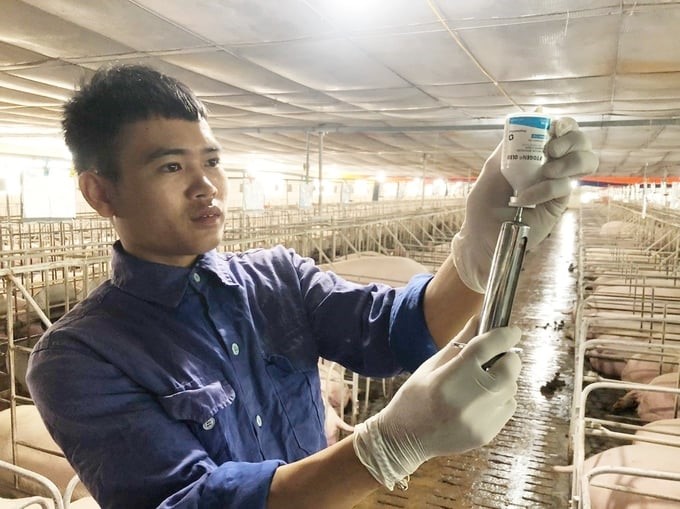
Strengthening vaccination is one of the most effective solutions to prevent and control diseases in cattle and poultry. Photo: Phuong Thao.
The Department of Animal Health forecasts that the risk of disease outbreaks in cattle and poultry in the last months of 2023 and early 2024 is very high. The reasons why epidemics easily arise include unusual weather; the situation of smuggled cattle and poultry trade, transportation, and imports that is still complicated and difficult to control; and slaughtering, which does not ensure food hygiene and safety.
Deputy Minister Phung Duc Tien said: "Legal documents, plans, projects, apparatus, funding, and a sophisticated staff already exist; vaccines are abundant; and chemicals are also available, so there is only need for implementation. It is mandatory to look straight at the truth and use all tools, experience, and staff to proactively prevent and control disease epidemics early and from afar. Each of us must ponder, think, and self-answer about our responsibility to the farm and farmers. It is true that there are many objective difficulties, but we need to look back to solve them."
"It is necessary to strengthen vaccination because this is an important solution in disease prevention and control. In addition, it is also necessary to build disease-free farming facilities and areas. Businesses must join hands with localities to quickly do this, thereby possibly promoting exports and bringing foreign currency to the country. At the same time, there is also a need for strengthening trade promotion. All rivers must flow to have a deeply integrated livestock industry," said Deputy Minister Phung Duc Tien.
Mr. Pawin Padungtod, Senior Technical Coordinator, Emergency Centre for Transboundary Animal Diseases (ECTAD), Food and Agriculture Organization of the United Nations (FAO), shared: “We appreciate the contributions of the veterinary sector and the Department of Animal Health for controlling infectious diseases globally. Vietnam's experience in disease control is a great lesson for neighboring countries, especially in using vaccines to prevent and control avian influenza. Currently, some countries in the Americas and Europe are considering using the vaccine. In addition, many pork-producing countries are looking at Vietnam, expecting the results as well as the impact of using the African swine fever vaccine on controlling this disease.
Translated by Huyen Vu Thu
![Reducing emissions from rice fields: [3] New values generated from carbon credit](https://t.ex-cdn.com/nongnghiepmoitruong.vn/608w/files/content/2025/05/19/dsc09613-144700_71-150957.jpg)
(VAN) In addition to helping safeguard the environment, the low-emission rice cultivation model also generates new opportunities for farmers by leveraging the carbon credit market.
![Ho Chi Minh city adapts to climate change: [1] Vulnerable in the whirlwind of development](https://t.ex-cdn.com/nongnghiepmoitruong.vn/608w/files/duyenht92/2025/05/19/3131-ngap-nongnghiep-163121.jpg)
(VAN) As the country's economic engine with a rapid urbanization rate, Ho Chi Minh city is facing increasingly serious consequences of climate change.
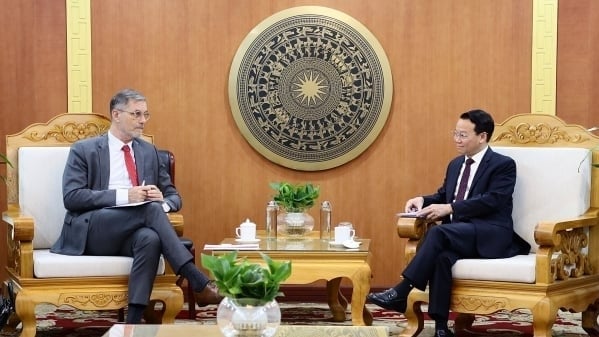
(VAN) On May 21, Minister of Agriculture and Environment Do Duc Duy worked with Mr. Olivier Brochet, Ambassador Extraordinary and Plenipotentiary of the French Republic to Vietnam.
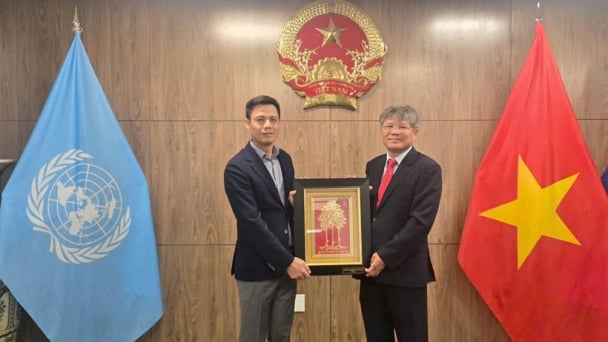
(VAN) VRG recently conducted a visit and working trip to the United States to demonstrate its efforts in redefining the role of rubber enterprises in the global value chain.

(VAN) In 2024, over 295 million people across 53 countries and territories faced acute hunger—an increase of almost 14 million people compared to 2023, while the number of people facing catastrophic levels of hunger reached a record high.

(VAN) World Environment Day 2025 (June 5) carries the theme 'Beat Plastic Pollution' continuing to emphasize the global urgency of addressing the plastic waste crisis.

(VAN) This was the assessment shared by experts at the workshop titled 'Assessing the Role and Potential of Low-Emission Rice Production Systems in Vietnam,' held on the morning of May 19.